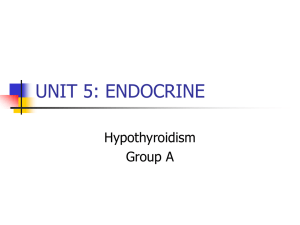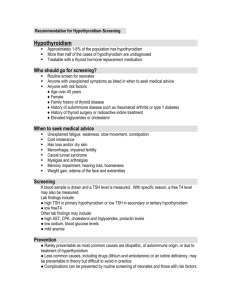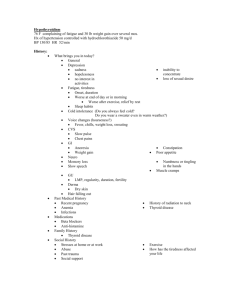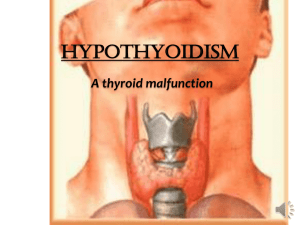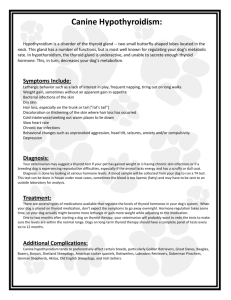Overtreatment of congenital hypothyroidism in the first two years of
advertisement
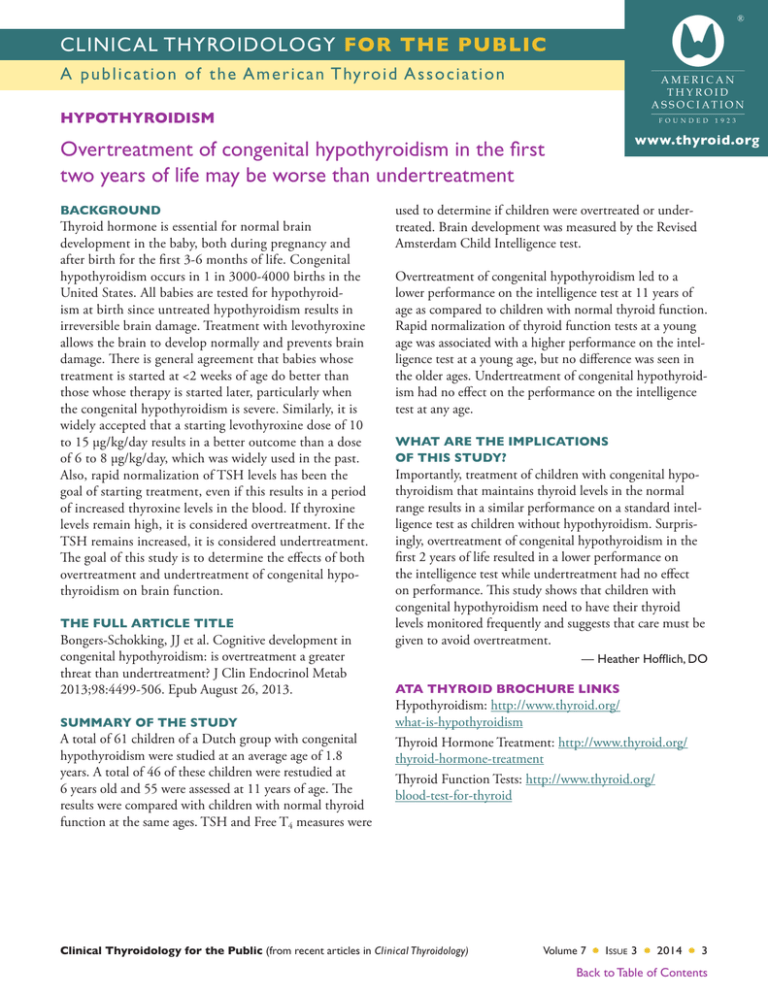
CLINICAL THYROIDOLOGY FOR THE PUBLIC A p u b l i c a t i o n o f t h e A m e r i c a n T hy ro i d A s s o c i a t i o n HYPOTHYROIDISM www.thyroid.org Overtreatment of congenital hypothyroidism in the first two years of life may be worse than undertreatment BACKGROUND Thyroid hormone is essential for normal brain development in the baby, both during pregnancy and after birth for the first 3-6 months of life. Congenital hypothyroidism occurs in 1 in 3000-4000 births in the United States. All babies are tested for hypothyroidism at birth since untreated hypothyroidism results in irreversible brain damage. Treatment with levothyroxine allows the brain to develop normally and prevents brain damage. There is general agreement that babies whose treatment is started at <2 weeks of age do better than those whose therapy is started later, particularly when the congenital hypothyroidism is severe. Similarly, it is widely accepted that a starting levothyroxine dose of 10 to 15 µg/kg/day results in a better outcome than a dose of 6 to 8 µg/kg/day, which was widely used in the past. Also, rapid normalization of TSH levels has been the goal of starting treatment, even if this results in a period of increased thyroxine levels in the blood. If thyroxine levels remain high, it is considered overtreatment. If the TSH remains increased, it is considered undertreatment. The goal of this study is to determine the effects of both overtreatment and undertreatment of congenital hypothyroidism on brain function. THE FULL ARTICLE TITLE Bongers-Schokking, JJ et al. Cognitive development in congenital hypothyroidism: is overtreatment a greater threat than undertreatment? J Clin Endocrinol Metab 2013;98:4499-506. Epub August 26, 2013. SUMMARY OF THE STUDY A total of 61 children of a Dutch group with congenital hypothyroidism were studied at an average age of 1.8 years. A total of 46 of these children were restudied at 6 years old and 55 were assessed at 11 years of age. The results were compared with children with normal thyroid function at the same ages. TSH and Free T4 measures were used to determine if children were overtreated or undertreated. Brain development was measured by the Revised Amsterdam Child Intelligence test. Overtreatment of congenital hypothyroidism led to a lower performance on the intelligence test at 11 years of age as compared to children with normal thyroid function. Rapid normalization of thyroid function tests at a young age was associated with a higher performance on the intelligence test at a young age, but no difference was seen in the older ages. Undertreatment of congenital hypothyroidism had no effect on the performance on the intelligence test at any age. WHAT ARE THE IMPLICATIONS OF THIS STUDY? Importantly, treatment of children with congenital hypothyroidism that maintains thyroid levels in the normal range results in a similar performance on a standard intelligence test as children without hypothyroidism. Surprisingly, overtreatment of congenital hypothyroidism in the first 2 years of life resulted in a lower performance on the intelligence test while undertreatment had no effect on performance. This study shows that children with congenital hypothyroidism need to have their thyroid levels monitored frequently and suggests that care must be given to avoid overtreatment. — Heather Hofflich, DO ATA THYROID BROCHURE LINKS Hypothyroidism: http://www.thyroid.org/ what-is-hypothyroidism Thyroid Hormone Treatment: http://www.thyroid.org/ thyroid-hormone-treatment Thyroid Function Tests: http://www.thyroid.org/ blood-test-for-thyroid Clinical Thyroidology for the Public (from recent articles in Clinical Thyroidology) Volume 7 Issue 3 2014 3 Back to Table of Contents CLINICAL THYROIDOLOGY FOR THE PUBLIC A p u b l i c a t i o n o f t h e A m e r i c a n T hy ro i d A s s o c i a t i o n HYPOTHYROIDISM, continued www.thyroid.org ABBREVIATIONS & DEFINITIONS Hypothyroidism: a condition where the thyroid gland is underactive and doesn’t produce enough thyroid hormone. Treatment requires taking thyroid hormone pills. Levothyroxine (T4): the major hormone produced by the thyroid gland and available in pill form as Synthroid™, Tyrosint™ and generic preparations. Congenital hypothyroidism: hypothyroidism that is diagnosed at birth. This occurs in 1 in 3000 to 4000 births. TSH: thyroid stimulating hormone – produced by the pituitary gland that regulates thyroid function; also the best screening test to determine if the thyroid is functioning normally. Thyroid hormone therapy: patients with hypothyroidism are most often treated with Levothyroxine in order to return their thyroid hormone levels to normal. Thyroid Awareness monthly campaigns announced in cooperation with PuraVida The ATA will be highlighting a distinct thyroid disorder each month and a portion of the sales for PuraVida bracelets will be donated to the ATA. The thyroid disorder designated for awareness this month is Cancer of the Thyroid and a bracelet is available through the ATA Marketplace to support thyroid cancer awareness and education related to thyroid disease. Clinical Thyroidology for the Public (from recent articles in Clinical Thyroidology) Volume 7 Issue 3 2014 4 Back to Table of Contents
